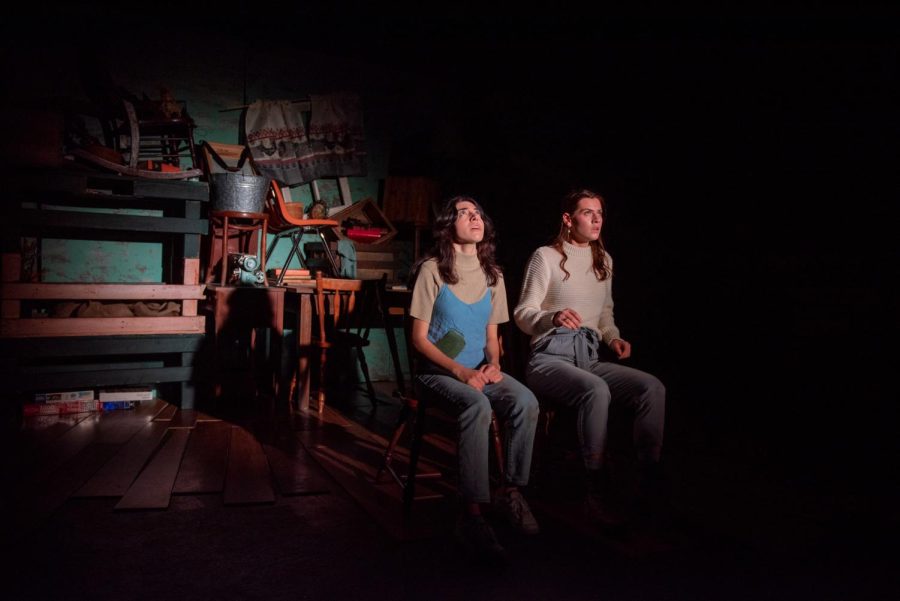Students petition for StuCo board positions, gain experience and community
Daily file photo by Jordan Mangi
Each fall and spring, students petition to StuCo theatre boards.
April 10, 2022
Over the last week, students have petitioned to join various theatre boards within Northwestern Student Theatre Coalition.
“I’ve been working on a lot of StuCo shows over the course of the year,” Communication freshman Philip Cullen said. “I wanted to get more involved in the (production) side of things, deciding what art was going to be produced and being part of the administrative group that leads the charge of producing it.”
Each fall and spring, students like Cullen go through the petition process to learn more about arts administration and find a tight-knit, theatre-based community. Students can apply to any number of the nine boards on StuCo. While each board’s petition process varies slightly, most consist of a written application and an interview.
The entire process lasts about a week and can be stressful, according to Communication junior Mark Berry. Berry is the incoming executive director of Purple Crayon Players and said the petition process is important because it allows boards to understand petitioners as people. Its longer petitions allow board members to gain a sense of petitioners’ artistic voices and motivations.
“Every petition we ask, ‘What types of conversations do you want to start with young people through art?’” Berry said. “The question that defines every petition for me is what are they genuinely interested in with art? Why are we doing this? Why are we producing theatre as a whole? What can we do to create better, more supportive, more healthy theatre?”
Once the process concludes, Berry said each theatre group sifts through petitions to make decisions on who to accept. Berry said PCP looks for students who want to work in a collaborative space and are committed to personal and external growth.
After each group on StuCo has a general sense of the petitioners it wants to take, the executive directors of all nine groups enter into one final conferral. Petitioners are restricted to being on one board, so they fill out a form to rank their groups of choice in preference order, which is taken into consideration in the final decision process. The decisions are released shortly after the last meeting and the turnover is close to immediate, Berry said.
Internal board members also need to re-petition, though the process is slightly different, Communication freshman Coco Gonzalez said. In the fall, Gonzalez successfully petitioned to Jewish Theatre Ensemble and joined as a freshman board representative. Now, she’s looking at taking a different role on the board, but said the petitions, apart from major positions like artistic and executive directors, are much more relaxed.
“Everyone knows everyone, and it’s really just to get a sense of where you want to be next year,” Gonzalez said.
Communication sophomore Elena Jaffe, PCP’s outgoing company manager, said being involved in a theatre board can teach students about arts administration. Students have the opportunity to learn about distribution and production, which is a change from the acting focus many are used to.
Jaffe added these skills can help students foster artistic relationships.
“It’s such an amazing learning experience,” Jaffe said. “A lot of times, when you transition into a petition, the previous member (who held the position) is still on the board. You get a lot of experience to be mentored and to mentor other people, and that’s a really special connection.”
Gonzalez said administration skills are becoming increasingly useful in the professional industry. As an actress, she said learning about all the work that goes into putting on a show was a humbling experience.
Beyond arts administration, Gonzalez said petitioning to a theatre board gives students a sense of community. The majority-student-run boards create a unique, special environment, she said.
“A bigger part of (petitioning is finding) the community and (the) people that you meet,” Gonzalez said. “It’s more than just a goal of putting on theatre. It’s about fostering a community that produces theatre that we want to see in the world in the future.”
Cullen petitioned three groups this cycle. He said he resonated with their missions and found great friends when he worked with members.
The waiting process has felt nerve-wracking, but Cullen said he’s excited to hear his results.
“(The boards) seem like very good, fun groups of people,” Cullen said. “It is a group of people who I really, really like and would like to work with more.”
Email: [email protected]
Twitter: @joannah_11
Related Stories:
— NU Declassified: When SURG meets showtunes
— Wirtz Center premieres Renaissance romp and Broadway musical “Something Rotten!”
— After COVID-19 shutdown, performance groups look to emphasize mental health over perfection


